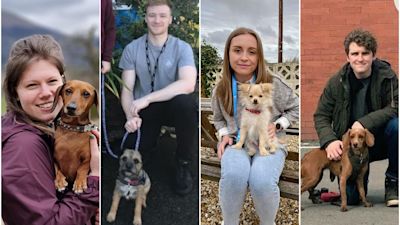The team of dogs and their owners helping school pupils cope with trauma during lockdown

A team of dogs have been helping pupils across schools in south Wales deal with trauma and issues with self-esteem, throughout lockdown.
The animals are part of The Therapeutic Animal Assisted Activities programme, also know as The Baxter Project. The dogs are taken into 11 primary and secondary schools to work with children and teenagers.
Dave O’Driscoll, who started the scheme three years ago with his four year-old border terrier Baxter, said the animals act as an ice-breaker to build relationships so children eventually feel safe to open up.
School leaders say the project has helped lead to better attitudes, behaviour and confidence in pupils, which has been particularly important during the pandemic.
The programme works with schools to identify young people most at risk of developing anti-social behaviour as well as those who have experienced things like neglect, abuse and bereavement.
Some are in care, or are young carers themselves, others are dealing with self-esteem and behaviour issues.
The team includes Dave and his dog Baxter as well as several other owners and their pets. The dogs and their owners work with pupils at 11 schools across south Wales.
While some schools have their own school dogs to help general wellbeing, Baxter Project dogs and their trained owners go into schools to work with specific pupils one-to-one.Dave, a trauma recovery practitioner, youth worker and former probation service officer, stressed that the dogs are not therapy dogs. The animals act as a bridge between the practitioner and young person.
The animals and their owners continued going into schools while they were only open to vulnerable and key workers’ children during lockdown.Marc Batten deputy headteacher Bassaleg High in Newport, one of the schools The Baxter Project visits, said the pandemic has made bad situations worse for a lot of young people.“There has been a plummeting effect on mood and self-esteem during the second lockdown," Mr Batten said.
“Some have suffered bereavement and found Baxter a way to help them express emotions.“I have been at this school since 1983 and managing mental health has always been a challenge - but the impact of lockdown on mental health has been massive. To be kept away from people has been really hard for young people. Some were crying when they were sent to self-isolate. Some were angry.“Animal companionship is a really good way of allowing people to relax. We know that the physical walking and emotional contact with Dave and Baxter helps.
“Some form tutors have come back saying teachers have noticed pupils in the project have become more confident and more prepared to make eye contact.
"Some young people have become more reflective and self-esteem has improved. It is having a huge bearing on many aspects.”
Ieuan Bartlett, Year 11 wellbeing officer at Willows High in Cardiff said Baxter Project dog Trixie and owner Sam Emrys have made a huge difference to pupils there.“There were a lot of stress and self confidence issues and with Covid on top it was all too much for some pupils," they said.
"A dog is an ice-breaker and the person they are talking to is not a teacher so it’s seen as more informal. They feel safe to offload and know they won’t be judged."We saw a noticeable difference in pupils working with them after the first three weeks they came in in the autumn term. Some who were shy are now more outgoing and confident.”
Pupils who work with the dogs cannot be identified but have sent in testimonials.One said: “Time away from school, to relax my brain and calm down. It’s easier to talk because the dog distracts me. I like getting stuff off my chest.”Another said: “Walking him and talking to him is fun. I like seeing them both. It takes my mind off stuff. It’s private.”Another summed it up with: “I can get stuff off my chest without having to worry about talking directly.”Sam Haines, who is part of The Baxter Project with his own dog Roo, has previously worked with the police on youth engagement.“It’s essential to build relationships slowly,” he said.“It usually takes two to three sessions for children to feel comfortable to open up. The child takes the lead and we go at their pace Roo loves children and holding her lead puts them in control.
“I had anxiety in school and was scared to share. It is our job to listen. I want children to know that we are listening.”